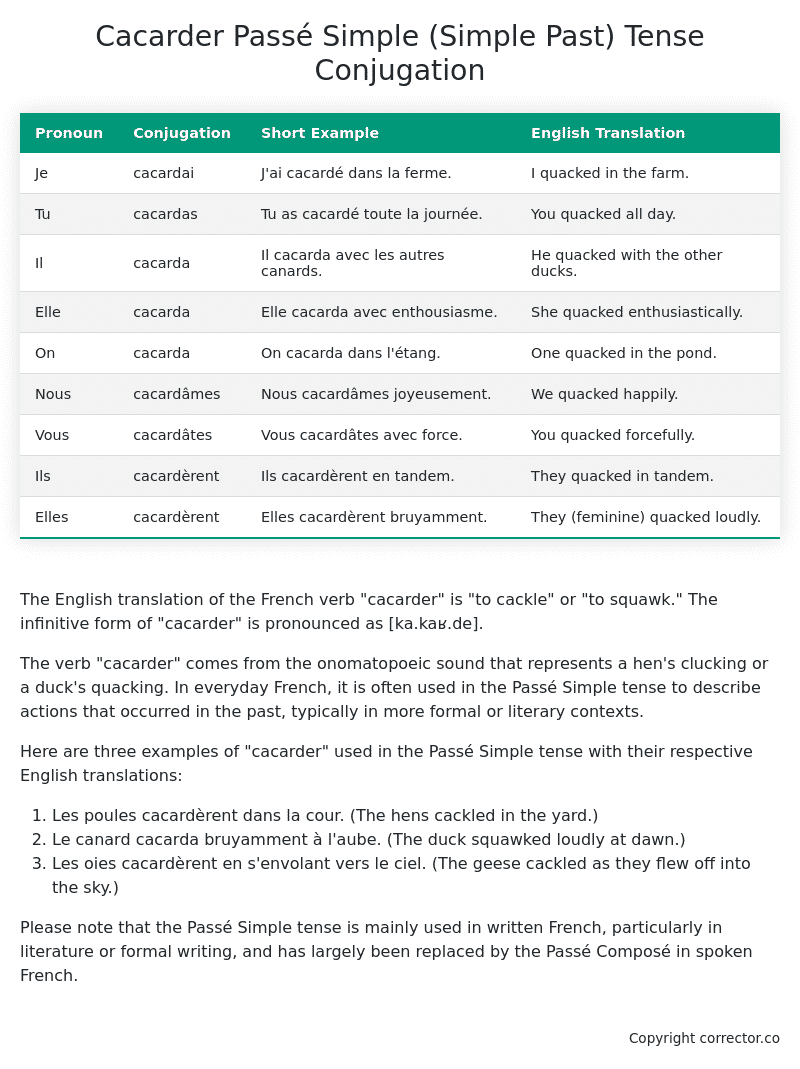Passé Simple (Simple Past) Tense Conjugation of the French Verb cacarder
Introduction to the verb cacarder
The English translation of the French verb “cacarder” is “to cackle” or “to squawk.” The infinitive form of “cacarder” is pronounced as [ka.kaʁ.de].
The verb “cacarder” comes from the onomatopoeic sound that represents a hen’s clucking or a duck’s quacking. In everyday French, it is often used in the Passé Simple tense to describe actions that occurred in the past, typically in more formal or literary contexts.
Here are three examples of “cacarder” used in the Passé Simple tense with their respective English translations:
- Les poules cacardèrent dans la cour. (The hens cackled in the yard.)
- Le canard cacarda bruyamment à l’aube. (The duck squawked loudly at dawn.)
- Les oies cacardèrent en s’envolant vers le ciel. (The geese cackled as they flew off into the sky.)
Please note that the Passé Simple tense is mainly used in written French, particularly in literature or formal writing, and has largely been replaced by the Passé Composé in spoken French.
Table of the Passé Simple (Simple Past) Tense Conjugation of cacarder
| Pronoun | Conjugation | Short Example | English Translation |
|---|---|---|---|
| Je | cacardai | J’ai cacardé dans la ferme. | I quacked in the farm. |
| Tu | cacardas | Tu as cacardé toute la journée. | You quacked all day. |
| Il | cacarda | Il cacarda avec les autres canards. | He quacked with the other ducks. |
| Elle | cacarda | Elle cacarda avec enthousiasme. | She quacked enthusiastically. |
| On | cacarda | On cacarda dans l’étang. | One quacked in the pond. |
| Nous | cacardâmes | Nous cacardâmes joyeusement. | We quacked happily. |
| Vous | cacardâtes | Vous cacardâtes avec force. | You quacked forcefully. |
| Ils | cacardèrent | Ils cacardèrent en tandem. | They quacked in tandem. |
| Elles | cacardèrent | Elles cacardèrent bruyamment. | They (feminine) quacked loudly. |
Other Conjugations for Cacarder.
Le Present (Present Tense) Conjugation of the French Verb cacarder
Imparfait (Imperfect) Tense Conjugation of the French Verb cacarder
Passé Simple (Simple Past) Tense Conjugation of the French Verb cacarder (You’re reading it right now!)
Passé Composé (Present Perfect) Tense Conjugation of the French Verb cacarder
Futur Simple (Simple Future) Tense Conjugation of the French Verb cacarder
Futur Proche (Near Future) Tense Conjugation of the French Verb cacarder
Plus-que-parfait (Pluperfect) Tense Conjugation of the French Verb cacarder
Passé Antérieur (Past Anterior) Tense Conjugation of the French Verb cacarder
Futur Antérieur (Future Anterior) Tense Conjugation of the French Verb cacarder
Subjonctif Présent (Subjunctive Present) Tense Conjugation of the French Verb cacarder
Subjonctif Passé (Subjunctive Past) Tense Conjugation of the French Verb cacarder
Subjonctif Imparfait (Subjunctive Imperfect) Tense Conjugation of the French Verb cacarder
Subjonctif Plus-que-parfait (Subjunctive Pluperfect) Tense Conjugation of the French Verb cacarder
Conditionnel Présent (Conditional Present) Tense Conjugation of the French Verb cacarder
Conditionnel Passé (Conditional Past) Tense Conjugation of the French Verb cacarder
Conditionnel Passé II (Conditional Past II) Tense Conjugation of the French Verb cacarder
L’impératif Présent (Imperative Present) Tense Conjugation of the French Verb cacarder
L’impératif Passé (Imperative Past) Tense Conjugation of the French Verb cacarder
L’infinitif Présent (Infinitive Present) Tense Conjugation of the French Verb cacarder
L’infinitif Passé (Infinitive Past) Tense Conjugation of the French Verb cacarder
Le Participe Présent (Present Participle) Tense Conjugation of the French Verb cacarder
Le Participe Passé (Past Participle) Tense Conjugation of the French Verb cacarder
Struggling with French verbs or the language in general? Why not use our free French Grammar Checker – no registration required!
Get a FREE Download Study Sheet of this Conjugation 🔥
Simply right click the image below, click “save image” and get your free reference for the cacarder Passé Simple tense conjugation!

Cacarder – About the French Passé Simple (Simple Past) Tense
Formation
Usage
Narration
Historical Context
Interactions with other tenses
Passé Composé
Imparfait
Conditional and Subjunctive
Summary
I hope you enjoyed this article on the verb cacarder. Still in a learning mood? Check out another TOTALLY random French verb conjugation!


